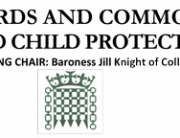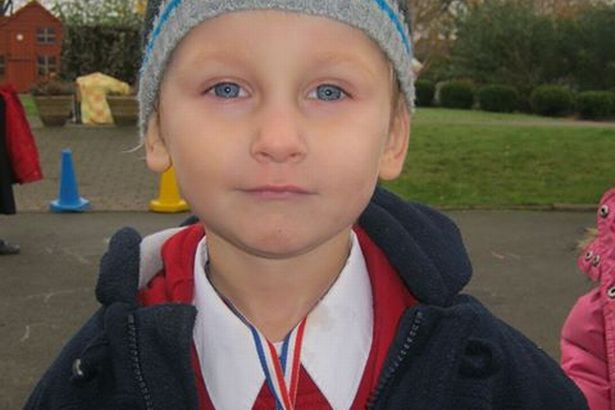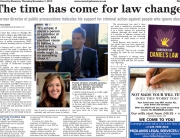Daniel’s Law will make it a legal obligation for people working with children to report suspected child abuse; it will enable those in ‘regulated activities’ to take action to help children in distress without hesitation or fear of reprisal.
Every signature counts. Please do what you can to spread the word and encourage more people to sign.
In the papers today:
Lessons from the tortured life of Daniel Pelka
Such extreme cases of child abuse conform to a pattern that the safety net fails to catch.
Ten days ago the country luxuriated in images of idealised parenthood, as the cameras showed the Duke and Duchess of Cambridge driving home with their newborn strapped safely into his car seat. Now, in a bleak counterpoint, we are presented with the opposite: two people who systematically starved and tormented a four-year-old out of existence. Daniel Pelka in his final months was a pitiful child, described before his death as a “bag of bones”.
New parents frequently remark upon the sudden, terrifying, realisation that they are now on their own; that the child they are transporting from the maternity ward is henceforward their responsibility. And it is perhaps remarkable that, in fact, the vast majority of children turn out all right. In the love and care lavished on them at home, they will be far closer to the privileged prince than to the sad little Polish child. But the regrettable truth is that, however few these extreme cases of child cruelty might be, they seem to conform to a pattern that our elaborate social safety net still finds hard to catch.
Perversely, one reason could reflect our better instincts – our tendency to believe the best, rather than the worst, of other people. Despite all the harrowing evidence to the contrary – Victoria Climbié (who died in 2000) and Baby Peter (2007) – even the professionals seem unwilling to countenance the depths of depravity to which some adults will sink. TheBaby Peter inquiry recommended that social workers and others should show more scepticism. But the fictions of Daniel’s mother appear repeatedly to have been given the benefit of the doubt.
Accomplished parental lying is a common element in all these terrible cases. But it is not necessary to see through this deviousness to identify several more failings that the Pelka case shares with the others. We could start with the number of different agencies involved. There are abused children who are completely hidden from view, but these were not among them. The inquiry into Victoria Climbié’s death noted that among those harbouring suspicions were the police, the social services of more than one local authority, the NHS, the NSPCC and local churches. Yet their knowledge was not pooled, or if it was, to no useful effect. Better communication between agencies was a central proposal.
Seven years later, crossed wires between social services, the police and the NHS were found to have contributed to the failure to prevent the death of Baby Peter Connelly. Six years on, something similar appears to have leftDaniel Pelka to the distinctly un-tender mercies of his mother and her partner. Those who made home visits often left without seeing him. The doctors who treated a broken arm were persuaded that it could have been an accident. Teachers who caught him trying to scavenge or steal food said they had tried to draw his bruised and emaciated state to the attention of social services, but if they did, the mother’s explanation about a food allergy was accepted and her instruction that he should not be fed obeyed. Although he was conspicuously below normal weight, no attempt seems to have been made to obtain an outside medical opinion: there appears to have been a marked reluctance to intrude upon a parent’s judgement.
Which connects to something else these cases have in common. Daniel’s parents, and his mother’s partner, were relatively recent Polish migrants, with – as the recorded phone calls show – barely adequate English. Daniel’s own poor English was one reason why, it was suggested, he might not have been able to confide in his teachers. Beyond this question of linguistic competence, though, was there perhaps something else – the ingrained reluctance of middle-class English professionals to challenge a lifestyle very different from their own?
At the time of her death, Victoria Climbié was living with her Francophone African aunt and her aunt’s boyfriend, and it was suggested that he saw her as being possessed by evil spirits. Baby Peter lived in what is sometimes called an unconventional household, with extended family and others coming and going much of the time. His mother, her new boyfriend and the boyfriend’s brother (the lodger) were all convicted of causing or allowing his death. Were doctors, social workers and others trying so hard not to be judgemental that they glossed over the multiple signs of cruelty before them?
Live and let live is an admirable sentiment, but there comes a point where a line has to be drawn. The abject failure of the UK authorities to bring anyone to book so far for the barbaric practice of female genital mutilation is another example of how we prefer to tiptoe around difference. Girls growing up in Britain are entitled to expect that they will not be subject to forced marriage or mutilated. So why do we not require annual medical examinations for all schoolchildren and apply more diligence to pursuing parents whose teenage girls suddenly vanish from school? This is something the French have got right. We need to show a bit more concern about what goes on in other people’s homes.
A third element that the cases of Victoria Climbié, Peter Connelly and Daniel Pelka have in common is the malign presence of a new male partner into the household. In each instance, it appears to be with the arrival of a new boyfriend in residence that the child’s victimisation really begins. From the torment and death of Maria Colwell at the hands of her stepfather in 1973, such an arrangement has long been recognised as a risk, but the dangers seem to be ignored time and again. We are not talking responsible stepfathers here, nor is this observation intended as an indictment of single mothers. But a new man sharing a home with someone else’s young children is something that should be taken into account.
As it happens, a US scientific study, published earlier this week, offered possible enlightenment on this front. It argued that monogamy had evolved among some mammals, including humans, as a way of keeping their progeny safe from malevolent male rivals. This research was reported by most UK papers, but not one was bold – or politically incorrect – enough to draw the obvious implications for real life or link it with the deaths of children, such as Baby Peter.
Daniel Pelka had the misfortune to live in a household that combined all these risks. Nor will he be the last child whose life will be cruelly cut short. So long as the home is treated as sacrosanct, even the most densely woven safety net will sometimes fail. In the end, it is those who perpetrated the fatal abuse who must accept their responsibility. Meanwhile, the rest of us should perhaps reflect that these tragic cases dominate the headlines not only because they are so harrowing, but because they are – still – few and far between.





